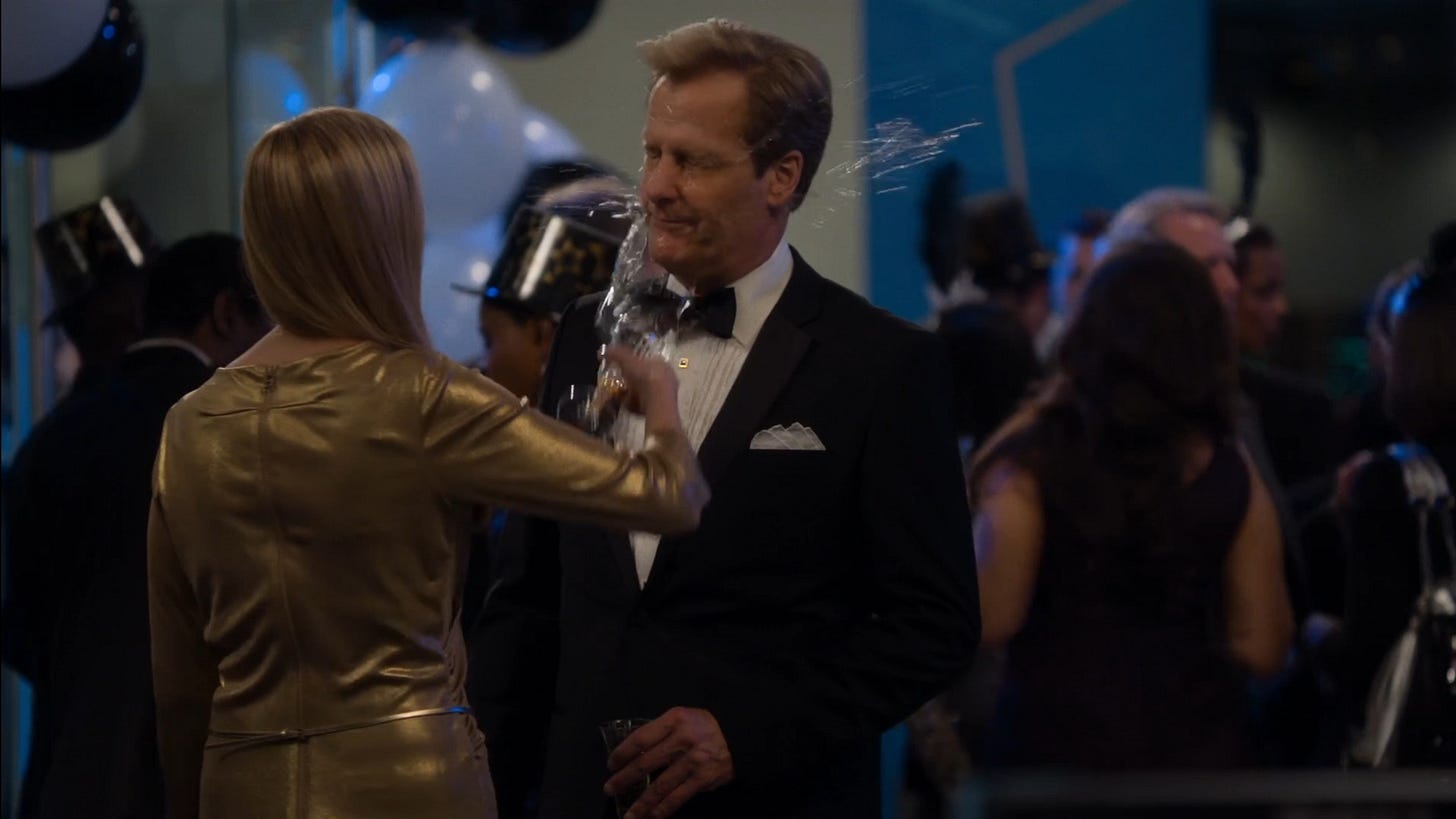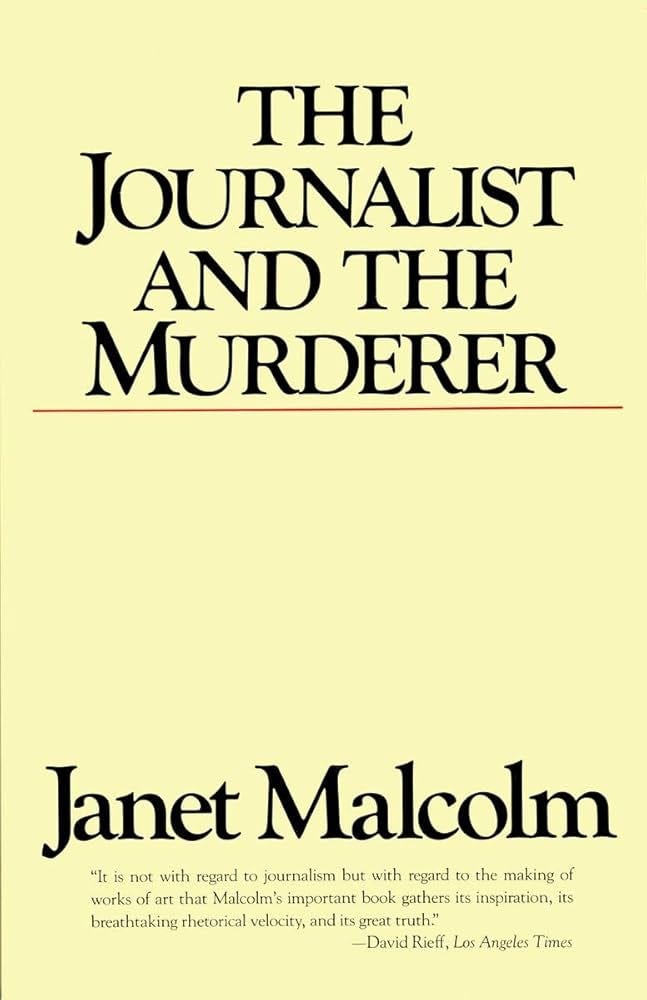This week…
Your reading time is about 10 minutes. Let’s start.

In the fourth episode of the first season of Aaron Sorkin’s The Newsroom (2012-2014), there is a compelling scene where news anchor Will McAvoy confronts entertainment reporter Nina Howard over the integrity of their work after Howard claims that they do “the same thing for a living.”
McAvoy, seemingly taking offence to that, responds, “That’s nuts, Nina. I tried to expose the truth about things of national importance.”
“Well,” Howard says, “I am trying to expose the truth about the fact that Britney [Spears] might have had a daughter when she was a teenager…”
“Why is that the concern for anyone except for Britney?” asks McAvoy.
“It’s not a concern. It’s entertainment,” says Howard.
“Here’s a thing, though,” says McAvoy. “It shouldn’t be.”
I have not watched the series in a long time but this exchange lingers with me as I reflect on the future of journalism, especially as we grapple with diverging professional identities: legacy media vs. digital publications, journalism school graduates vs. influencer-journalists, crime reporters vs. true-crime podcasters, the prestige of one beat over the other (you used to get ‘relegated’ to do court reporting if you did a boo-boo in the newsroom), etc.
These divisions highlight not only differences in topics and approach but also raise fundamental questions about the ethics of news and entertainment, about accuracy and responsibility in information-sharing.
Now, as someone who is currently studying the law and having just completed a crash course on criminal law and the criminal justice system (I skipped the first year of law school because I already have a first degree and carried forward my university credits but I still wanted to do the Year 1 ‘supplementary courses’ because FOMO lol), it makes me question journalism ethics beyond the myopic lens of a journalist.
Don’t get me wrong—this is not something new to me. As a science journalist, I have often challenge reports that fail to question the scientific status and validity of forensics and psychoanalysis, for example. This was one of the issues reflected in my speedrun through the criminal law syllabus: Not all these techniques are legal to use in court as evidence, and even so, it varies greatly between jurisdictions.
And, it occurred to me that my practice and study of the law, journalism, and science intersect greatly at this point, it’s crashing my mind. It’s all I am thinking about. Journalism’s purpose, after all, lies in pursuing truth—a principle that should also guide scientific inquiry and legal practice.
Well, upon contemplation, I used to think like McAvoy from that scene in The Newsroom. Then, I dated a very privileged person who just returned from living overseas for a decade, who dared to paint the entire journalism industry in Malaysia with a broad brush, calling us all, without reservations, government dogs.
You see, before leaving the country, there was no ‘Internet media’ and broadcasters and newspaper publishers needed government-issued permits, which could be revoked due to non-compliance—so, there was some truth to that. But that changed within the decade because the Internet had democratised access to information. And I was, at the time, working for an independent radio station with the guile and the guts to circumvent government censorship, mostly.
So I felt that it was an ignorant and patronising thing to say. I felt defensive about my profession, but I would have to go to bat for all the reporters not in the room with us—including the entertainment reporters. I felt, right then, I had to do it. So we fought.
“You’ve been gone for so long, you did not bother to keep abreast with national developments, you contributed nothing to strengthening the country’s democracy, and you have the gall…”
I don’t know who won but we never had another date after that.
Today I will defend also the influencer-journalist. It’s not a matter of who went to journalism school. Many decent journalists never set foot in a classroom dedicated to news.
In fact, professionalising journalism has brought unintended consequences. What was once a working-class field has grown exclusive, with entry often limited to those who can afford journalism degrees and unpaid internships. This shift contributes to a narrowing of perspectives in newsrooms, leaving many journalists disconnected from the communities they aim to serve.
The core issue lies in accountability—the structures that allow news organisations to fact-check, edit, and uphold ethical standards. Influencers, typically operating as individuals, often lack these structures, and sure, some may even lean into their bias to boost popularity. The individuals doing “their own research” exemplify another challenge: The ease with which people misinterpret or selectively analyse complex topics due to a lack of foundational skills stemming from a misplaced confidence in one’s understanding—and that continues to disrupt informed public discourse.
Meanwhile, legacy news organisations sometimes undermine their credibility when they boost columns and opinion pieces over the news and analysis, when they do away with roles like public editors, removing a crucial layer of accountability, or, you know, when they let billionaire owners hold editorial veto power…
So you know, maybe that repatriate wasn’t so wrong after all. We’re all the dogs—billionaire newspaper owners, fictional millionaire news anchors, gossipy entertainment columnists, exasperated science journalists, lowly court reporters. All dogs. Just different breeds.
Your Wikipedia this week: Snowclone
And now, a selection of top stories on my radar, a few personal recommendations, and the chart of the week.
ICYMI: The Previous Block was about the hunter, dancer, and busybody. FWIW:
One in 20 new Wikipedia pages seem to be written with the help of AI ($) by Chris Stokel-Walker for New Scientist.
Why Wikipedia has landed in legal trouble in India by Umang Poddar for BBC.
Polish broadcaster shuts down AI-run radio station after a week following backlash by Agata Pyka for Notes from Poland.
CORRECTION NOTICE: None notified.ON THE MEDIA
The increasing threats against lawyers protecting journalists
Emily O’Sullivan for GIJN:
“Behind all those cases against journalists who have become household names—like Evan Gershkovich, Maria Ressa, and José Rubén Zamora—there are the often unseen lawyers representing them and taking remarkable risks to defend them,” Carolina Henriquez-Schmitz, director of TrustLaw, said at Trust Conference 2024. “[Lawyers] themselves are becoming the targets of a whole range of attacks.”
In recent years, threats have escalated. Azerbaijani lawyer Elchin Sadigov, and his client, journalist Avaz Zeynalli, were detained in 2022 while officers searched their homes and offices and seized confidential case files. Vo An Don, a Vietnamese human rights lawyer who represented a dissident blogger was disbarred in 2018 and subsequently sought political asylum in the US. Dmitry Talantov, a lawyer who represented Russian investigative journalist Ivan Safronov in 2021, now himself faces up to 15 years in prison on a number of charges.
Loosely linked:
Georgia’s elections and the Kremlin’s empire by Natalia Antelava for Coda.
‘Independent media could disappear’: Georgian journalists on the country’s high stakes elections by Nick Lewis for CPJ.
‘I couldn’t cry over my children like everyone else’: the tragedy of Palestinian journalist Wael al-Dahdouh by Nesrine Malik for The Guardian.
‘If you scream no one will hear you’: Pakistani journalists report in fear amid spike in media killings by Sonali Dhawan for CPJ.
ON AI
AI search could break the web ($)
Benjamin Brooks for MIT TR:
At its best, AI search can better infer a user’s intent, amplify quality content, and synthesize information from diverse sources. But if AI search becomes our primary portal to the web, it threatens to disrupt an already precarious digital economy. Today, the production of content online depends on a fragile set of incentives tied to virtual foot traffic: ads, subscriptions, donations, sales, or brand exposure. By shielding the web behind an all-knowing chatbot, AI search could deprive creators of the visits and “eyeballs” they need to survive.
If AI search breaks up this ecosystem, existing law is unlikely to help. Governments already believe that content is falling through cracks in the legal system, and they are learning to regulate the flow of value across the web in other ways. The AI industry should use this narrow window of opportunity to build a smarter content marketplace before governments fall back on interventions that are ineffective, benefit only a select few, or hamper the free flow of ideas across the web.
Loosely linked:
Could AI curb conspiracy theory beliefs? by Claudia López Lloreda for Undark.
After teen’s suicide, Character.AI is still hosting dozens of suicide-themed chatbots by Maggie Harrison Dupré for Futurism.
Gender choice in media chatbots can reproduce sexist stereotypes by Katherine Pennacchio for LJR.
ON SCIENCE
Apparently fake social media accounts boost Azerbaijan before COP29
Damian Carrington for The Guardian:
Scores of apparently fake social media accounts are boosting Azerbaijan’s hosting of the Cop29 climate summit, an investigation has revealed.
The accounts were mostly set up after July, at which time seven of the top 10 most engaged posts using the hashtags #COP29 and #COP29Azerbaijan were critical of Azerbaijan’s role in the conflict with Armenia, using hashtags such as #stopgreenwashgenocide. By September this had changed, with all of the top 10 most engaged posts coming from the official COP29 Azerbaijan account.
Global Witness, which conducted the analysis, said artificially inflating the reach of government posts was drowning out independent criticism of the country’s record on the climate crisis and repression of human rights.
Loosely linked:
Climate disinformation is compromising Taiwan’s efforts in defending democracy by Elena Yi-Ching Ho for The Diplomat.
The existential terror of hurricanes can fuel climate change denial by Jamie Goldenberg (University of South Florida), Emily P. Courtney (University of South Florida), and Joshua Hart (Union College) for The Conversation.
Far-right governments seek to cut billions of euros from research in Europe by David Matthews for Nature.
Jonathan Pruitt was prolific, influential, and charming. Then academic sleuths started poking around by Sarah Treleaven for The Walrus.
Other curious links, including en español et français

LONG READ | ‘You tried to tell yourself I wasn’t real’: what happens when people with acute psychosis meet the voices in their heads? by Jenny Kleeman for The Guardian.
INFOGRAPHIC | What’s so special about the human brain? by Kerri Smith, infographics by Nik Spencer, and illustrations by Phil Wheeler for Nature.
“Las ‘fake news’ provocan problemas de orden público”: bulos sobre agua no potable, rotura de presas y teléfonos de emergencias por Javier Salas en El País.
Cada vez nos da más igual proteger nuestra intimidad y va a tener consecuencias funestas por Paula Corroto en El Confidencial.
Datos personales: derecho tutelado después de la muerte por Julieta del Río en Proceso.
Pourquoi il faut bel en bien en finir avec les « articles fantômes » par Cyrille Frank dans Media Culture.
IA : 71,2% des français sont préoccupés par l’utilisation de leurs données personnelles, selon une étude par Virginie Achouch dans The Media Leader.
La « frénésie » autour de l’ingérence étrangère jette une ombre sur la communauté chinoise par Bifan Sun dans Pivot.
What I read, listen, and watch
I’m reading The Journalist and the Murderer (1989) by Janet Malcolm, the controversial book on the study of the ethics of journalism. For context, here's a sentence from the opening paragraph: “Every journalist who is not too stupid or too full of himself to notice what is going on knows that what he does is morally indefensible.” In general, I do not take too seriously the words of someone who is (1) so obsessed with psychoanalysis and (2) as a result, often inserts her views into the narrative. However, criticisms of the vocation, a once-blue-collar job turned elite profession, are almost always, valid, at least to some degree.
I’m listening to a Citations Needed podcast on Bari Weiss’ Silicon Valley-funded media empire.
I’m watching ARTE.tv’s video on how Russia is trying to destabilise Europe.
Chart of the week
Desire to migrate abroad from Africa reaches new high, reports Alexander Onukwue for Semafor.




